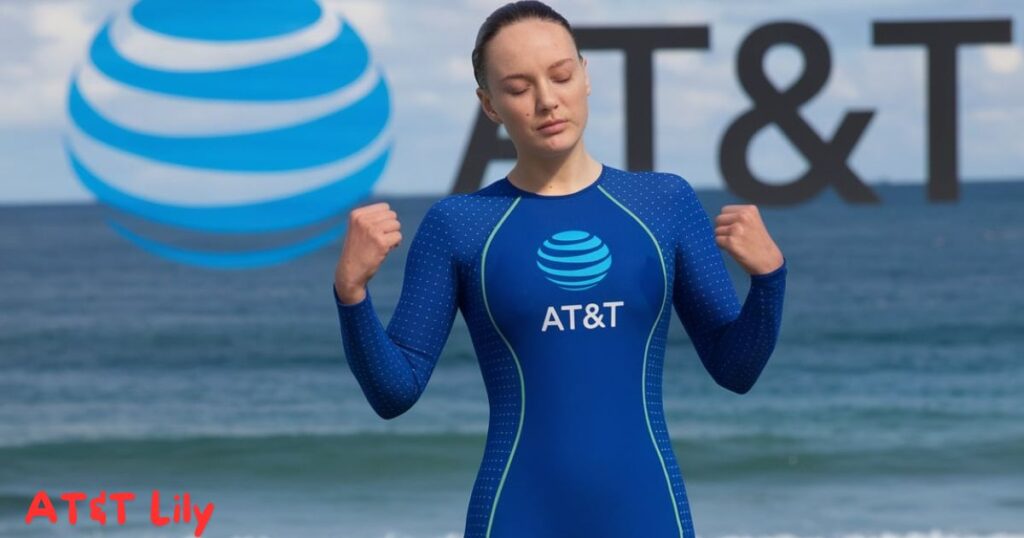In the age of viral content and social media storms, rumors can spread like wildfire. One such rumor that captured the internet’s attention was the alleged firing of AT&T’s beloved commercial star, Lily Adams, over a full-body bathing suit.
This article delves into the truth behind this sensational claim, exploring its origins, impact, and the broader issues it raises about media literacy and representation.
Introduction
The digital landscape has become a breeding ground for misinformation, and the story of AT&T’s Lily being fired for wearing a full-body bathing suit is a prime example.
This headline, which has circulated for years, sparked outrage and confusion among fans of the popular commercial character. However, as with many viral stories, the truth is far more complex than the clickbait suggests.
Who is AT&T Lily?

Lily Adams, portrayed by actress Milana Vayntrub, has become a household name thanks to her endearing performances in AT&T’s long-running commercial series.
Dressed in her signature blue shirt and khakis, Lily’s quirky personality and relatable struggles with phone plans have charmed audiences since 2013.
Vayntrub’s portrayal of Lily has transcended the typical commercial character, becoming a pop culture icon in her own right.
Her down-to-earth demeanor and witty banter have made her synonymous with the AT&T brand, showcasing the power of effective advertising in creating lasting impressions on consumers.
The Full-Body Bathing Suit Controversy
The controversy erupted when a social media post allegedly featuring Lily in a full-body bathing suit went viral. The post claimed that AT&T had fired Lily for this seemingly innocent choice of attire, sparking outrage among fans and critics alike.
Many decried the supposed decision as an example of body-shaming and a lack of support for female employees. The story quickly gained traction, with numerous social media users expressing their disappointment in AT&T and rallying behind Lily.
Also read this: Plessner Coaching in lutherstraße 2 34327 körle
A Deeper Look at the Narrative

Upon closer examination, several inconsistencies in the viral story become apparent. Firstly, there is no evidence that AT&T has ever implemented a policy against full-body bathing suits. Like most companies, their dress code guidelines focus on professionalism and avoiding offensive clothing choices.
Moreover, Milana Vayntrub, the actress behind Lily, has never publicly commented on wearing a full-body bathing suit or being fired for such an action. These facts alone cast significant doubt on the validity of the viral claim.
So, Where Did This Story Originate?
The truth behind the clickbait is far less dramatic than the viral post suggested. Fact-checking website Snopes investigated the rumor and concluded that it was false. Their research revealed that the image of Lily in a full-body bathing suit was likely manipulated using photo editing software.
Some reports suggest that the online chatter stemmed from a malicious attempt to exploit Vayntrub’s image and generate controversy. This highlights the dark side of internet culture, where misinformation can be weaponized for clicks and engagement.
Exploring the Underlying Issues
While the bathing suit firing story itself is fabricated, it brings to light several important issues. The ease with which misinformation spreads online is alarming, demonstrating the need for critical thinking and media literacy in the digital age.
Furthermore, the story taps into larger societal conversations about body image and the pressure on women to conform to unrealistic beauty standards. The fact that so many people believed the story speaks to the prevalence of these concerns in our culture.
Lily As a Role Model
Despite the fabricated controversy, Lily’s character remains a positive force in advertising. Her portrayal challenges conventional advertising tropes by showcasing a relatable, intelligent woman who isn’t afraid to be herself.
In a world obsessed with airbrushed perfection, Lily’s quirky charm resonates with audiences, particularly young women seeking authentic representation in media.
The Importance of Media Literacy in a Digital Age
The “bathing suit firing” story serves as a stark reminder of the importance of media literacy.
In today’s fast-paced digital environment, information travels at lightning speed, making it crucial to be a discerning consumer of online content.
Before sharing or reacting to something seen online, it’s essential to verify its source and credibility.
The Legacy of Lily Adams
Lily Adams has transcended the confines of a typical commercial campaign. She has become a symbol of relatable humor and a reminder that women can be both intelligent and funny in media portrayals.
Although the “bathing suit firing” narrative was fabricated, it sparked important conversations about body image and the power of representation in advertising.
The Role of Social Media Influencers
The rumor gained significant traction due in part to the actions of some social media influencers. Capitalizing on the controversy, certain influencers amplified the story without verifying its authenticity.
This irresponsible behavior not only fueled the spread of misinformation but also eroded public trust in online personalities.
Fact-checking and Responsible Journalism
Thankfully, reputable news outlets and fact-checking websites like Snopes stepped in to debunk the rumor.
Their efforts exposed the manipulated image and highlighted the lack of evidence to support the firing claim. This fact-checking played a crucial role in mitigating the damage caused by the initial misinformation.
Body Image and the Media
While demonstrably false, the “bathing suit firing” story did spark a necessary conversation about body image and the media’s portrayal of women. Many online discussions focused on the unrealistic beauty standards often perpetuated in advertising and entertainment.
Lily’s character, with her unpretentious style and focus on intelligence over looks, became a positive point of reference in this discussion.
A Missed Opportunity for AT&T
The fabricated controversy presented a unique opportunity for AT&T to showcase its commitment to diversity and body positivity.
A well-crafted response, acknowledging the concerns raised and emphasizing their inclusive company culture, could have strengthened their brand image. However, their silence on the matter left room for speculation and potentially alienated some customers.
The Evolution of the AT&T Commercials
Interestingly, the AT&T commercials featuring Lily Adams did undergo a gradual shift over time. The initial portrayal focused more on her quirky personality and struggles with phone plans.
However, as the campaign progressed, the commercials began to showcase Lily in a more empowering light. She tackled challenges at work, navigated social situations with confidence, and ultimately became a role model for young women.
The Enduring Appeal of Lily Adams
Despite the controversy surrounding the “bathing suit firing,” Lily Adams remains a beloved character. Her relatability, humor, and intelligence continue to resonate with audiences.
The success of the AT&T campaign lies not just in catchy slogans, but in the creation of a character who defied stereotypes and empowered viewers to embrace their individuality.
FAQ’s
What happened to Lily the AT&T girl?
Contrary to rumors, nothing significant happened to Lily (Milana Vayntrub). She continues to appear in AT&T commercials, and the story about her being fired over a bathing suit was fabricated.
Why are they placing her body like that in those ads?
AT&T’s commercials focus on Lily’s personality and humor rather than her physical appearance. Any perceived changes in how she’s presented are likely due to evolving advertising strategies rather than deliberate body positioning.
Does Lily still work for AT&T Wireless?
Yes, Milana Vayntrub continues to portray Lily in AT&T commercials as of 2024.
Who is the Lily in the AT&T commercials?
Lily is portrayed by actress Milana Vayntrub, who has been the face of AT&T’s advertising campaigns since 2013.
Final Thoughts
The AT&T Lily bathing suit controversy serves as a cautionary tale about the power and pitfalls of social media. While the story was ultimately proven false, it sparked important conversations about body image, representation in media, and the spread of misinformation online.
As consumers of digital content, it’s crucial to approach viral stories with a critical eye and seek out reputable sources for fact-checking.
The enduring popularity of Lily Adams demonstrates the positive impact that relatable, authentic characters can have in advertising, challenging stereotypes and connecting with audiences on a deeper level.

Hello, I’m Henry, a committed writer at supersbusiness.com, where I specialize in Business, Finance, Real Estate, and News. My articles explore a wide range of topics, providing readers with insightful and engaging content. With a knack for simplifying complex ideas, I aim to make my writing accessible and informative for all. Stay informed on the latest trends and insights by following me on supersbusiness.com.

